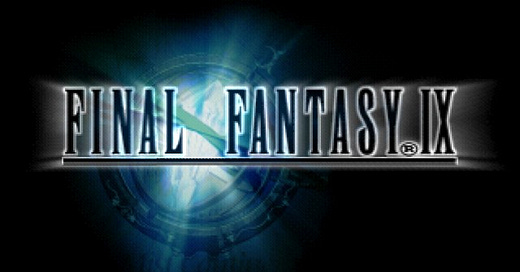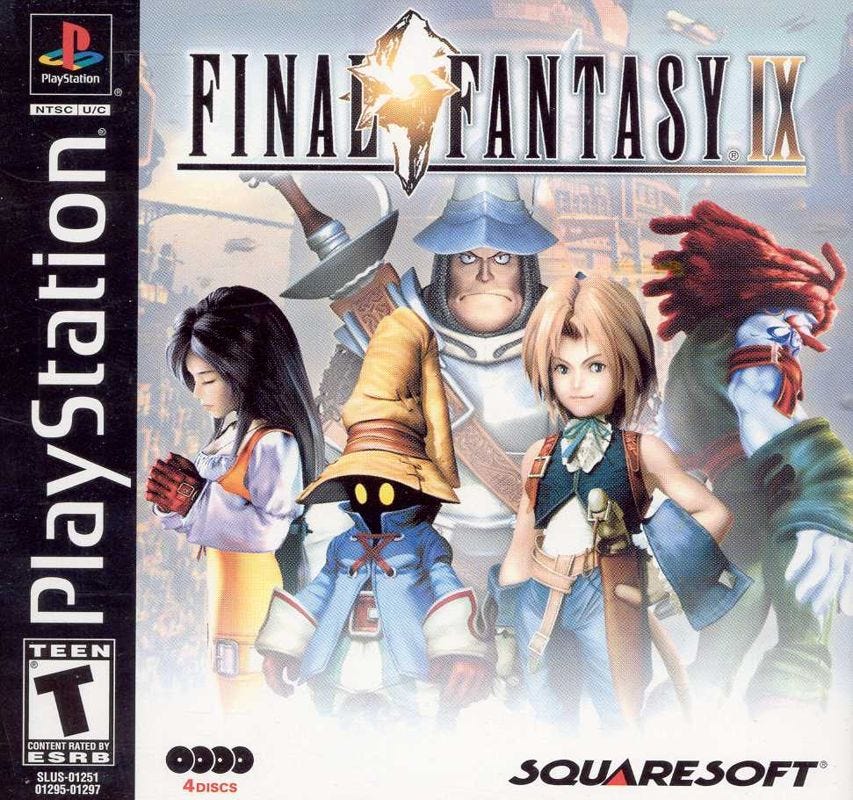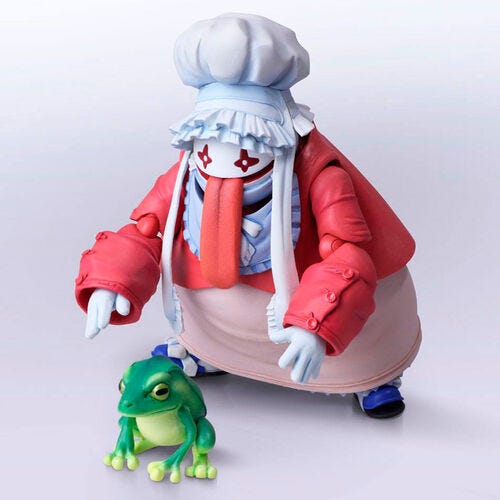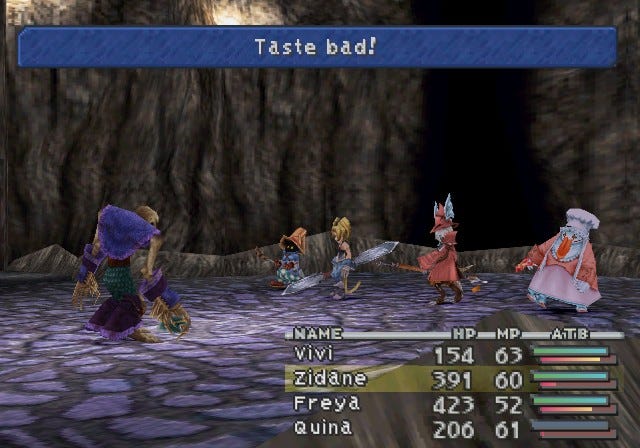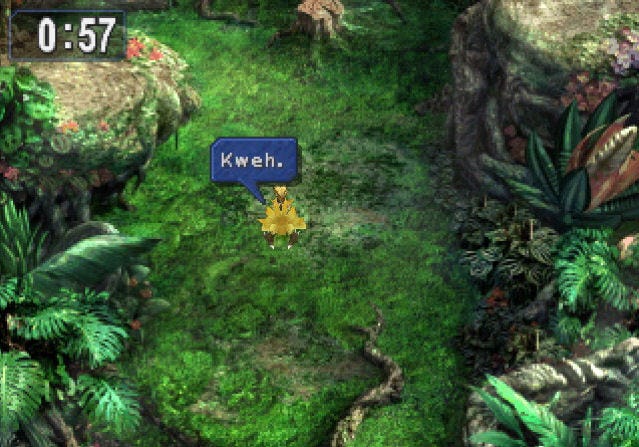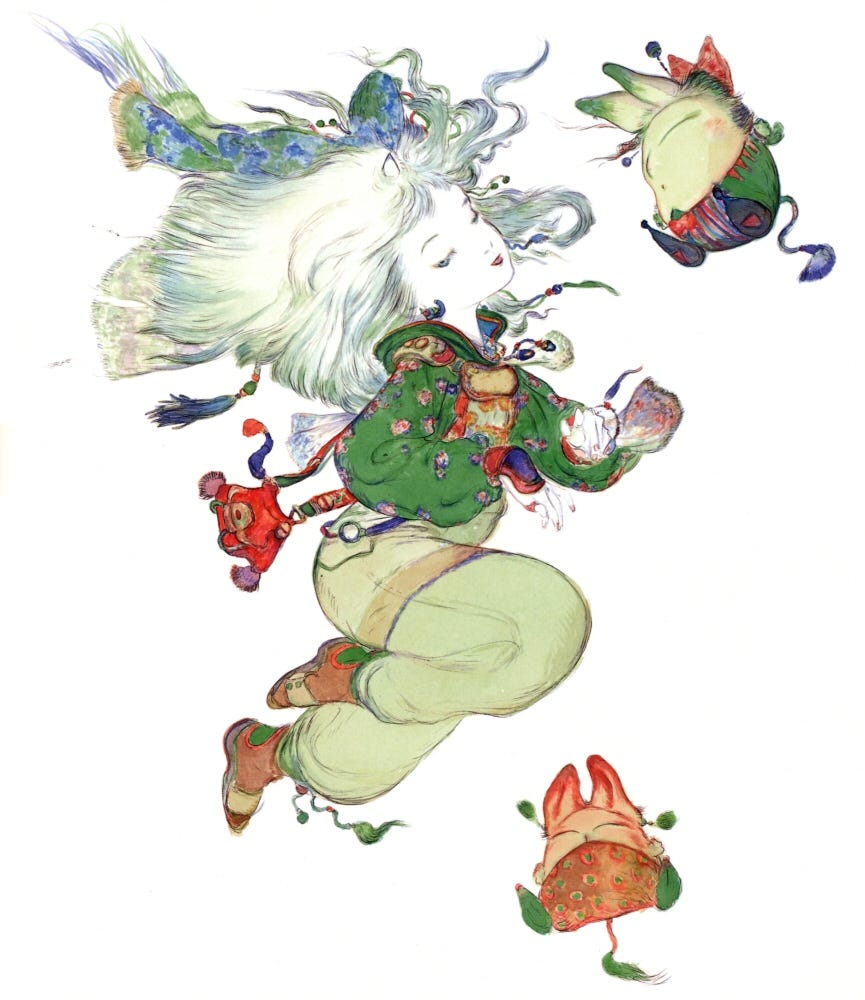Most games “journalism” tends to have little value, but here’s my crack at it anyway.
Final Fantasy IX is the 9th entry in the longstanding, famous series of Japanese roleplaying games from Square-Enix (then Squaresoft), which released in the year 2000, turning 23 on July 7th. It is the third and last Final Fantasy mainline entry for the Playstation console.
If you’ve been keeping up at all with my stream at Twitch, I decided to crack the game back open, exclusively on Friday evenings for 2-3 hours at a time. This game and I, we have a sordid history… It was, for all my memory allows, one of the first video games I ever bought with my own money. To my retrospective confusion: I hadn’t played any of the other games in the series at that time, didn’t know anything about it, and didn’t know why I bothered with it at all, other than something turning over in my brain when I saw it in behind the glass. Perhaps it was the name, the cover art, and its enigma from combination of the two. It was $40, I think.
It was a wholly mysterious game to me, much larger than anything else at that point. It was my favorite game for years, I went through all four discs (to be honest, I love that games at one point were multiple discs, it gave a sense of Epic scale or prestige event, like James Cameron’s Titanic being on 2 VHS tapes) several times experiencing the story, before moving on years later. This is something of a review, how it compares to the me then to the one at present.
A stress from the developers is that FF9 was a “return to form”, in that of a simpler, higher fantasy setting involving more Knight & Dragon type aspects, like the series’ origins. This also involves the overall tone, the series drifted to more serious territory since FF6, FF9 was set to lighter, more comic moods without sacrificing those loftier themes. It’s lighthearted, and has brighter, earthier colors that reflects these attitudes. It is graphically appealing and among the best looking for a Playstation game, and is in a steampunk sort of society. To many players, myself included, this was a welcome change (though I played the others after), and within the series as it is now, even many games later, is still something of an individual. The localization is very good, the dialogue is concise, expressive and suggestive with an economy.
For the unfamiliar, the story starts with an abduction. Through a Trojan Horse maneuver in the guise of the touring, annual play “I Want To Be Your Canary” (a Shakespeare referencing joint, “Taming of the Shrew” spiritual title but a tragedy, and penned by the in-game lore character “Lord Avon”) a nearby kingdom aims to kidnap a princess for unclear reasons. The game’s protagonist and who the player controls, Zidane, is among the abductors. The abduction is mostly successful.
From there it goes through many transformations. Though the “abduction” theme never really finishes throughout, the game goes to a drama in a weapons of mass destruction struggle, cold war, and genocide among other things. To make matters worse for the heroes, it is eventually discovered the planet which they inhabit has been monitored since its beginnings, manipulated in the obscure by an alien force. The goal of these invaders is using the planet as a sort of galactic terrarium and farm, to incite civil war among the nations, the deaths of people feed a transfer of “souls” which are collected by a spaceship, and when enough are accrued, the dying alien planet can consume the heroes’ planet and restore the devouring planet’s fertility.
Twists and turns are standard, and FF9 is full of them. They won’t be detailed here. At this point it will be an assumed familiarity of the game or the series to a level, or at least a disregard of any presumed knowledge.
The combat in this game is something I like, even if most fans do not. The load times are not very good, and it takes what feels like ages for characters to act. This never really bothered me to begin with, but it is apparent. Ways characters attain abilities and the passive skills are interesting, even if stages in later chunks of the game render little in the way of customization. Characters have “jobs” in that they are combinations of classic Final Fantasy character classes, ie Warrior, Thief, Monk, White/Black/Blue Mage, Samurai, Dragoon, etc. The simplicity of it, like most things similar, always remind me of what I love about Dragon Quest games, which is just that— a simple story told simply, with a fairly uncomplicated way about it but suggests deeper things and can be very emotional. The “overdrive” mechanic Trance, has a cool name. In battles themselves it is nearly uncontrollable and feels random, and mostly ignites at inopportune times. It’s hard to feel supportive of such behaviors as a player, but they are varied enough to still feel fun and individual.
For mini-games, Chocobo Hot & Cold is a fun way to explore the game’s world and on the while gain rare and powerful items via scavenger hunt, often ahead of the curve of the narrative. Tetra Master, the in-game card game, I like also even if I shouldn’t, especially when compared to its earlier more useful version in FF8, Triple Triad. The rest of the mini-games are so few, short, small, and unrewarding that they don’t even compare, and leave little impact.
The sounds and sound design, and music by Nobuo Uematsu in this game are fantastic.
The game’s greatest strength is its direction and handling of the material. The characters vary wildly from each other, visually and in demeanor, from innocuous to strange to hot-headed to refined images of formers. They’re excellent Yoshitaka Amano designs. The diversity of the NPCs, whether through race or personality, is a comfy, wide array. The story, although simple, does reach contemplative areas and can be emotionally affecting in tandem. The love stories themselves, one a major undercurrent, the other not, are also delivered with tact. Even the goofy, almost comedy throwaway one, between a stodgy, old fashioned, emasculated knight and the Apex Feminist General, works well, because it works for their relationship. In the major one between Zidane and Garnet, it’s fun to see how they change into vastly different persons by the end and retain centers. They help each other, often at each other’s lowest points, which unavoidably develops to the point where they can’t be without.
Zidane is a cad. Streetwise and deceptive, but from the start has a caring disposition with loyalty to friends above all. As time goes on Zidane slowly sheds his womanizing nature into a more mature representation of the devotion to his friends, his compassion grows him into a rock and an inspiration or a fascination to the rest. He embodies the contradiction of compassion to sense, putting himself in harm’s way for what seems like lost causes. Having a thief class as the “main” character within the scope of the series is interesting.
Garnet is the innocent; curious, reserved, and practically raised in conservatory but learns to be unafraid of letting her manners go and flirts with Zidane from time to time. Her inexperience and childlikeness often send her into catastrophic situations and dark times of the soul, the death of her mother and kingdom in ruins, battling a long depressive episode (she becomes temporarily mute, which bleeds into the mechanics in that she can’t concentrate in battle, skipping her turn), but no matter what she goes through she continues, through her nature, to understand and overcome, becoming a stronger, nuanced person for making it through. The game is about Garnet as much as it is about Zidane.
Vivi also has one of the strongest arcs in any of the series. Fished out of the sky like a Little Prince star by one of the last of a race until their death, Vivi has amnesia and seeks his identity. He ends up with a scam ticket to the show at the beginning, going onward to this Space Opera scaled story where he finds he’s actually one of those weapons of mass destruction, told he is doomed to die, which hurls his perception of purpose into an oblivion. Taking cues from Zidane, his admitted hero and bro (one point they share a soul-searching moment ending with Just Two Guys Pissing off of a ledge together in the dark), Vivi finds his own reasons which are congruent with Zidane’s, and eventually becomes his conscience, reminding Zidane of those reasons to keep him on track. Through his strength he becomes an image of hope to the other Black Mages, a people created in a factory and manipulated for evil.
Eiko has reappraised as an underrated character. My kid self never really liked her, misunderstood her. She’s on the surface fairly annoying, but I think that comes from living as a child in seclusion, bound to the prison of protecting the home of the people of which she is the last survivor, desperate to project herself into the lives of her discovery. The group finding her home opens her to possibilities actualized, and gives both Garnet and her living proof of heritage. She crushes on Zidane, the first man she’s probably ever seen, so that makes sense. Her dialog for the most part is pretty great, she’s crass and direct, will say things others are afraid to even though she’s 1/3 their size. This is vaguely introduced in her professed frequent bouts with the infamous giant Hilgigars (below), the first boss you fight with her in your party. Just as Vivi completes Steiner and Zidane, Eiko completes Garnet.
Kuja is one of the better villains of the series. For much of the beginning he is a figure with a mysterious past and goals, parading around with the dramaturgy of Charles Laughton as Caeser, like he’s conducting an orchestra of grand design. He like Zidane is created for a purpose (one that puts him in the delusion of Superman) and rejects that, and when he learns that like his Black Mage inventions that death is his fate, it breaks him, and he seeks to destroy everything. In spite of all he does, in the end he is not complete evil, and in just a few clauses after the final boss, turns our whole position towards him into something else, something that makes sense into why he became who he was or why he reacted in those ways. This comes too little too late, and through Zidane’s compassion once again.
Final Fantasy IX is a wonderful, joyful game, and a classic, I didn’t know if I would have fun or connect with it ever again. I’m sad to see it go this time. I don’t know if or when I will come back, whether it holds any more secrets or something new to learn. What is certain is that it still holds power and value, and fun, even after all these years. If you’ve experienced it for the first time on the stream or never experienced it, I have no choice but to encourage it. It’s one thing to watch it or read about, but it’s best experienced for yourself.
One can easily buy the game on Steam. Or emulate it.
